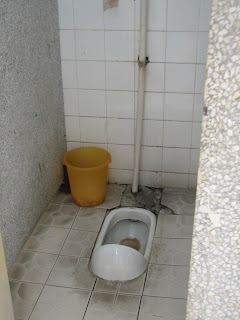


China has changed a great deal in the last 25 years. Our first visit was in 1983, and at that time, China was closed to most things of the Western world. We heard many stories of the "persecuted church" and were amazed that there were so many believers after almost 35 years of atheistic rule. We had the opportunity to take a large suitcase of Bibles to some of the Christians there, which were gratefully received because they had not been available for many years.
Today's China has embraced the Western world, both the good and the bad and the most important thing I've learned after three additional visits is that people are people all over the world. They have the same desires and concerns for their families and the same hunger for God that everyone else has. We have been told that as many as 4% of China's population are Christians -- in a country that has been officially atheistic and with no foreign missionaries for over 60 years. God certainly is at work! However, we struggle to understand the current situation of the Church in China and the amount of freedom that Christians have to practice their faith. It seems that there are credible stories of persecution in recent years, but also there is clearly a strong vibrant Church growing very quickly in this part of the world.
The organization we have worked with the past two years (ESEC -- Educational Services Exchange with China) began working in China about 29 years ago and has been very careful to establish trust with the government by being above board and respectful of China's laws against proselytizing. We are told that today, the Chinese Education Department welcomes our program because they see its value to Chinese people, even though they are aware that all who come are Christians. We are very careful to avoid direct evangelism and will only discuss our faith as a result of direct questions from individuals.
My favorite phrase to describe our work in China is to "spread the love of Jesus everywhere, using words if necessary." We show the love of God to our students as we work with them day by day, and they definitely notice. The two most common questions are "Why are you bowing your head before you eat?" and "Why would you come all the way to China to help us?" Both are wide open doors to share our faith, which we do in a variety of ways.
This year, I had one student ask me some questions about my faith in God and I was able to explain to her that God's love is not something that we have to work for ... that we want to please him because He loves us. She was very interested in the concept that we give gifts to our children because we love them, not because they have done something to deserve it and asked if we could talk about it later. We set a time and then later in the day she asked if she could bring her friend. Of course! As we met the next day, we talked a little further about God's love and then I asked her friend (another of my students) what she thought about it. Her immediate response was "I want that! -- I want to be like you...to have what you have." I was rather startled by her response, since I had not said anything to her about God before. To make sure she understood what we were talking about, I explained God's plan for salvation and after patiently listening, she again said "I want that!" What an honor and blessing to be able to pray with her as she accepted Jesus Christ as her Savior and Lord. I was able to give her a Chinese/English Bible (printed in China and purchased at the legal registered church we attended --not smuggled in!) and she explained that a neighbor of hers at home attends a Christian church. Please pray for Sally as she comes to mind, because I have no email for her or way to keep in touch.
















